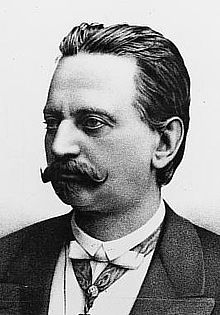Eduard Taaffe, 11th Viscount Taaffe
|
Hochgeboren Eduard Franz Joseph Graf von Taaffe, Viscount Taaffe |
|
|---|---|

Count Eduard Taaffe, Viscount Taaffe
|
|
| 2nd Minister-President of Cisleithania | |
|
In office 24 September 1868 – 15 January 1870 |
|
| Monarch | Francis Joseph I |
| Preceded by | Karl Fürst von Auersperg |
| Succeeded by | Ignaz Feirherr von Plener |
| 10th Minister-President of Cisleithania | |
|
In office 12 August 1879 – 11 November 1893 |
|
| Monarch | Francis Joseph I |
| Preceded by | Karl Ritter von Stremayr |
| Succeeded by | Alfred Fürst zu Windisch-Grätz |
| Interior Minister of Cisleithania | |
|
In office 14 April 1870 – 6 February 1871 |
|
| Monarch | Francis Joseph I |
| Prime Minister | |
| Preceded by | Carl Giskra |
| Succeeded by | Karl Sigmund Graf von Hohenwart |
| Interior Minister of the Austrian Empire | |
|
In office 7 March 1867 – 30 December 1867 |
|
| Monarch | Francis Joseph I |
| Prime Minister | Friedrich Ferdinand Graf von Beust |
| Preceded by | Friedrich Ferdinand Graf von Beust |
| Succeeded by | Carl Giskra |
| Personal details | |
| Born |
24 February 1833 Vienna, Austrian Empire |
| Died | 29 November 1895 (aged 62) Ellischau (Nalžovy), Bohemia, Austria-Hungary |
Eduard Franz Joseph Graf von Taaffe, 11th Viscount Taaffe (24 February 1833 – 29 November 1895) was an Austrian statesman, who served for two terms as Minister-President of Cisleithania, leading cabinets from 1868 to 1870 and 1879 to 1893. He was a scion of the Irish Taaffe noble dynasty, who held hereditary titles from two different countries: Imperial Counts (Reichsgrafen) of the Holy Roman Empire and viscounts in the Peerage of Ireland (in the United Kingdom).
Taaffe was the second son of Count Louis Taaffe, 9th Viscount Taaffe (1791–1855), Austrian Minister of Justice during the Revolutions of 1848 and president of the court of appeal. His ancestor Francis Taaffe, 3rd Earl of Carlingford (1639–1704) had entered the service of the Habsburg Monarchy in the 17th century; the family held large estates in Bohemia.
As a child, Eduard Taaffe was one of the chosen companions of the young Archduke Francis Joseph, who in 1848 was crowned Emperor of Austria, which opened him a distinguished political career in the service of the Habsburgs. He studied law at the University of Vienna and entered public service in 1852. From 1861 he served at the Bohemian crown land government in Prague and in 1863 was appointed Landespräsident (stadtholder) in the Duchy of Salzburg. He backed the implementation of the February Patent constitution under State Minister Anton von Schmerling and in 1864 became a member of the Bohemian Diet (Landtag), where he did however not excel. In 1867 the Chairmen of the Ministers' Conference Count Richard Belcredi appointed him Upper Austrian stadtholder at Linz.
...
Wikipedia
